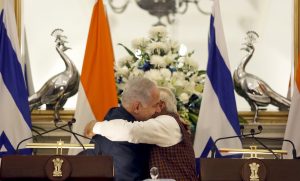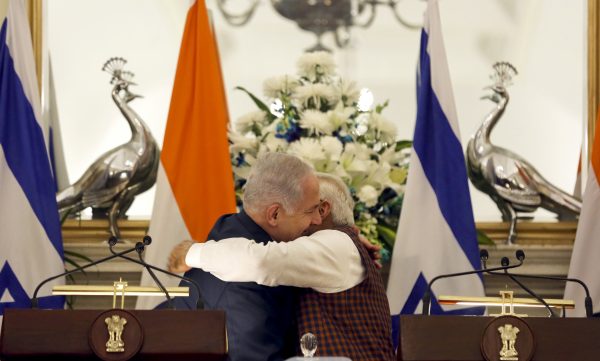
Israeli Prime Minister Benjamin Netanyahu, left, and India’s Prime Minister Narendra Modi, hug each other during a joint media interaction in New Delhi, India, January 15, 2018.
Credit: AP Photo
There are many ways to describe Israel’s response to Hamas’ horrific attack – justice, vengeance, collective punishment, or the exercise of its right to defend itself. In its attack on Israel, Hamas could have chosen to focus on military and security targets and avoided killing civilians. Instead, it acted with craven brutality by attacking women and children. Hamas revealed its true character and chose to be cruel and merciless, and for that, it deserves to be eliminated.
But those observers who are sensitive to the history of Western colonialism and imperialism, and have not forgotten the brutal military means with which the British, the French, and other Western powers had frequently crushed legitimate struggles for freedom (remember the Sepoy Mutiny of 1857 and Jallianwala Bagh massacre of 1919), Israel’s response looks like a brutal assault by the combined economic, diplomatic, and military might of the Global North – the U.S., Europe, and Israel – on a small colony of about 2 million people fighting for independence and statehood.
Yes, Hamas is a terrorist organization. Its dismal record of governance signals its priorities clearly. But most Gazans are innocent civilians, half of them children, bearing the terrible burden of 16 years of blockade by Israel and Egypt, and several assaults by a vastly superior Israeli force. The poverty, underdevelopment, and lack of political autonomy over its own borders make Gaza emblematic of what constitutes “the southern” in the concept of the Global South.
Indeed, there is no place south of Palestine in the Global South. It is a colony that is described by its inhabitants as an “open air prison.”
Diplomat Brief
Weekly Newsletter
Get briefed on the story of the week, and developing stories to watch across the Asia-Pacific.
Get the Newsletter
As the Global North indulges in indiscriminate and endless bombing, forcefully displacing a million Gazans, where is India, the champion, and the voice of the Global South?
In 2023, India held the presidency of the G-20 forum. It hosted a grand and successful G-20 summit. The summit brought India much diplomatic attention and raised its profile. India sought to distinguish itself by claiming that it would become the voice of the Global South at the G-20 and bring the concerns and issues of developing nations to the forum of the world’s richest and biggest economies. India even hosted a virtual summit that was attended by over 120 nations of the Global South to collect their views and in the various meetings that it hosted as part of its presidency, many nations were invited to participate in G-20 deliberations. India also played an important role in the inclusion of the African Union in the G-20, effectively making it the G-21.
But since the crisis in Palestine broke out, India has been missing in action. The leader of the Global South is not speaking for the Global South. India’s initial reaction was a post on X, formerly Twitter, by Prime Minister Narendra Modi condemning the terrorist attack on Israel and stating that India stood by Israel.
Modi then took a call from Israeli Prime Minister Benjamin Netanyahu in which he repeated his support for Israel. Days later, as Israel’s response started generating thousands of civilian deaths, including children, India’s foreign policy spokesperson in a brief stated that India’s long-standing policy was a two-state solution and India strongly supported the creation of a sovereign, independent and viable Palestinian state existing side by side with Israel in peace.
Advertisement
There has been no statement about the situation in Gaza from Modi or External Affairs Minister S. Jaishankar. India’s leadership is mum. It is as if India is irrelevant to the Middle East crisis. This posture of India where the leadership stands with Israel and balancing statements are made by bureaucratic staff does not behoove a nation that claims to be a global leader and seeks to distinguish itself by bringing the voices of the marginalized to the global stage.
Did Modi remind Netanyahu in their phone call that “this was not the era of war,” as he famously told Russian President Vladimir Putin? Did Modi also ask the Israeli leader to exercise restraint and not kill civilians and children indiscriminately? Did he remind Netanyahu that cutting off food, electricity, and water is collective punishment, both cruel and against international law as the U.N. secretary- general has stated very clearly?
After seeing what Israel is doing to the Palestinians, its nonstop bombing of Gaza for 12 days, does India still stand with Israel and its hardline response?
How can India support a “sovereign, independent and viable Palestinian state” and remain silent when all hope for such an outcome is extinguished through illegal settlement expansions by Israel in the West Bank and zero progress in peace talks in years?
India’s diplomatic passivity undermines its fervent desire to be included in global governance, to have a permanent seat at the U.N. Security Council with the privilege of a veto. India is competing with China for the leadership of the Global South, but at a time when the Global South needs it, India is nowhere. This passivity as other nations take the lead will also hurt India’s standing in the Muslim world as it seeks to enhance its engagement with Arab nations to its west and ASEAN nations in the east.
In every forum that India seeks a role in — the SCO, BRICS, G-77, ASEAN, and the broader Global South — a sizeable component is made up of Muslim nations horrified at what is happening to Gazans. With a firmer stance against terrorism as well as against military excesses, India could protect its interests in the Muslim World and give itself a bigger voice on the world stage.
India, at the moment, is not coming across as a global leader taking decisive steps to address a major global crisis. Its actions will not convince the world that it deserves a role in global governance. It is coming across as a self-absorbed marginal nation unwilling to step up, fearful of being excluded from the cool clubs of the Global North by standing with the Global South.

